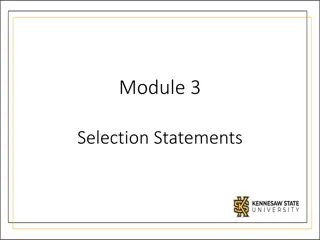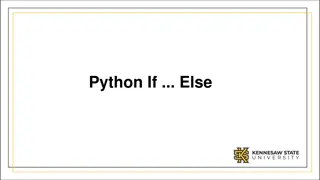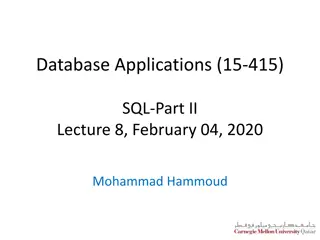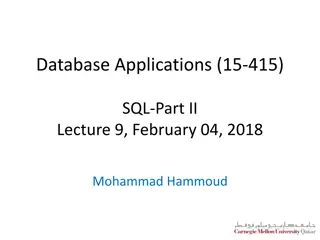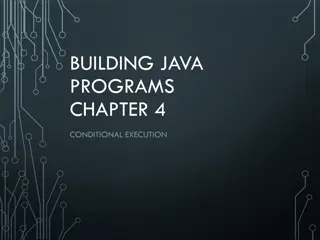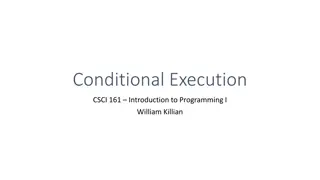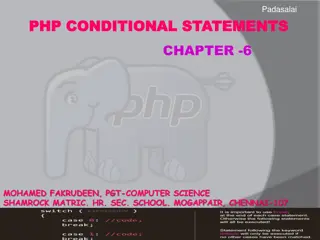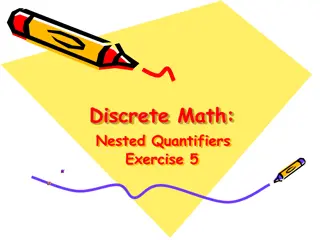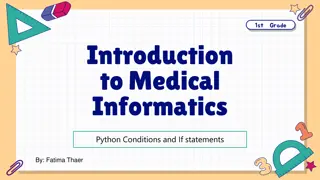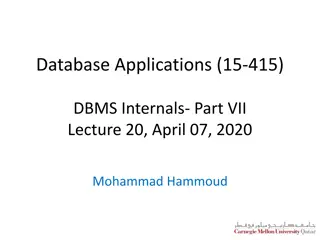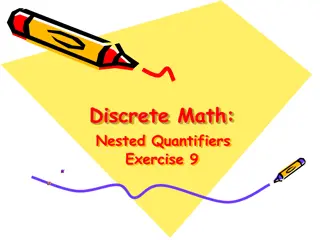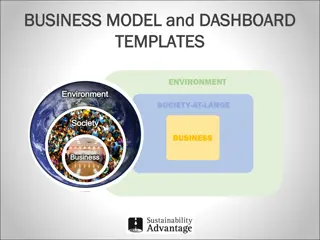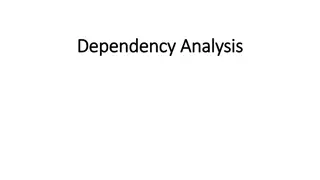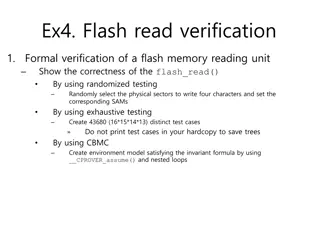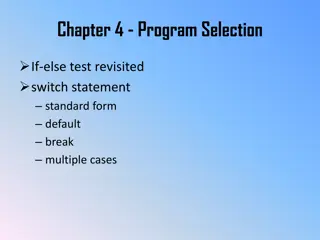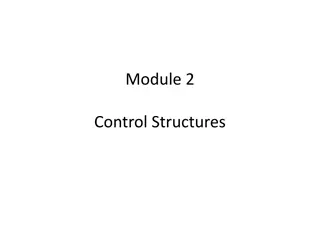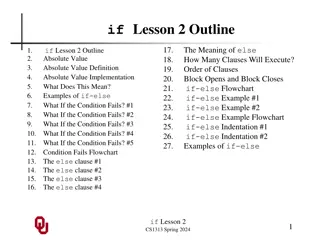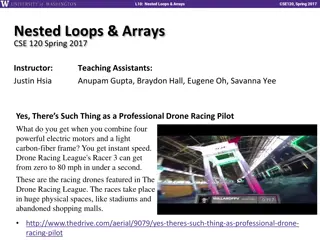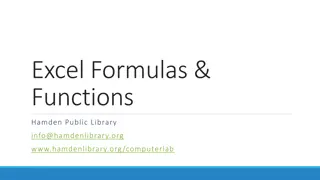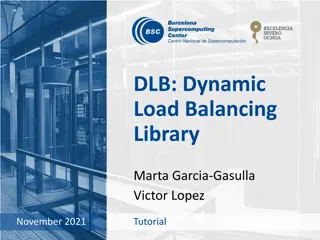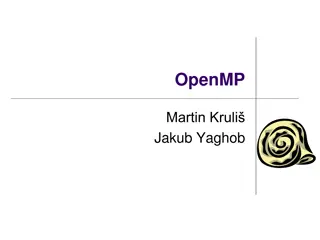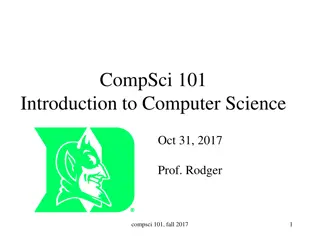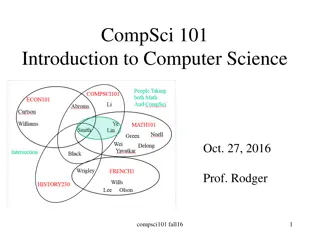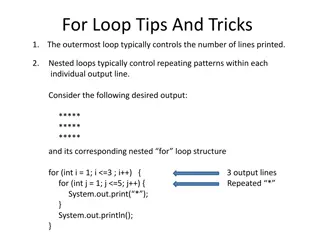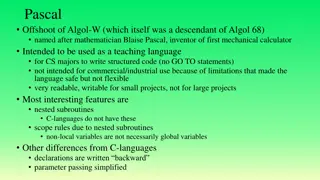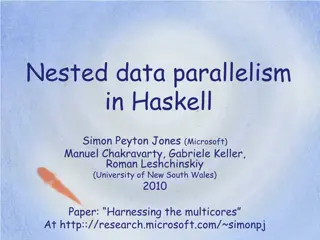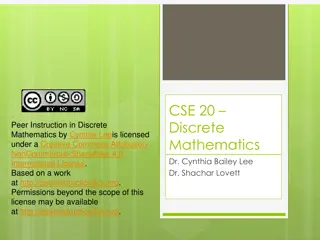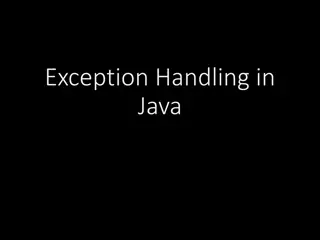Introduction to Selection Statements in Programming
Selection statements in programming allow for executing specific blocks of code based on certain conditions. They provide a way to control the flow of a program by evaluating Boolean expressions. The use of if, if-else, if-else-if, and switch statements enables programmers to create multiple paths o
5 views • 53 slides
Python If...Else Statements
Python supports various logical conditions for IF statements and loops. It uses indentation to define code scope instead of curly brackets. The ELIF keyword allows for additional conditional checks, while the ELSE keyword provides a fallback for unmet conditions. Shorthand if statements and logical
8 views • 33 slides
Comparing Logit and Probit Coefficients between Models
Richard Williams, with assistance from Cheng Wang, discusses the comparison of logit and probit coefficients in regression models. The essence of estimating models with continuous independent variables is explored, emphasizing the impact of adding explanatory variables on explained and residual vari
1 views • 43 slides
Control Structures in Programming
Control structures in programming allow programmers to manage the flow of execution with selection/decision and repetition/loop structures. This chapter explores different types of selection control structures like if, if-else, nested if-else, and switch-case statements, providing examples and exerc
2 views • 30 slides
Evolving Business Models in the 21st Century: Embracing Interdependencies
Business models in the 21st century are evolving to acknowledge nested interdependencies with society and the environment on a finite planet. New global risks and impact points are challenging businesses, highlighting the need for a shift towards a circular economy. The traditional business model co
2 views • 7 slides
Transforming SNOMED CT Translation with Nested Concepts and Expression Templates
Adopting nested concepts and expression templates revolutionizes SNOMED CT translation, offering a more structured approach that streamlines the process from selection to standardization, enhancing accuracy and efficiency significantly.
0 views • 25 slides
SQL Query Examples and Operators
This comprehensive guide provides examples of SQL queries utilizing various operators such as the BETWEEN comparison operator, aggregate functions, having clause, nested subqueries, and set membership. It covers practical examples including finding instructors within a salary range, counting custome
1 views • 13 slides
SQL Queries and Joins in Database Applications Lecture
Discover a comprehensive overview of SQL queries, including nested and deeply nested queries, in the context of database applications. Learn about joining tables, finding sailors who reserved specific boats, handling NULL values, and more in this informative lecture featuring examples and explanatio
0 views • 53 slides
SQL Part II Lecture Summary: Nested Queries, Joins, and Updates for Database Applications
In this SQL lecture, Mohammad Hammoud covers nested queries, insertion, deletion, updates, handling NULL values, join variants, and advanced query techniques. Examples include finding sailors who have reserved specific boats, using nested queries to filter data, and deep nested queries for complex d
0 views • 53 slides
Conditional Execution in Java Programming
Explore the concept of conditional execution in Java programming with if/else statements, relational expressions, and misuse examples. Discover nested if/else structures and their application in decision-making logic. Enhance your understanding of executing code based on specific conditions.
0 views • 24 slides
Conditional Execution in Programming
Conditional execution, such as the if statement, allows executing specific blocks of code based on certain conditions being met. This concept is fundamental in programming and is demonstrated through examples like if, if/else, relational expressions, and nested if/else constructs. The incorrect usag
2 views • 44 slides
PHP Conditional Statements for Decision Making Logics
Conditional statements in PHP are essential for decision-making logics, allowing the execution of specific code blocks based on defined conditions. This article covers different types of conditional statements like if, if-else, if-elseif-else, and switch in PHP, along with syntax examples and their
0 views • 17 slides
Deconvolving Snow Cover and Snowfall Passive Microwave Signals
This research focuses on deconvolving snow cover and snowfall passive microwave signals using GPM data. The study employs a data-driven approach to estimate snowfall using a nested K-nearest algorithm and observed irregularities. By analyzing variations in brightness temperatures (Tbs) over snow-cov
0 views • 9 slides
Nested Quantifiers Exercise on Love Statements
This exercise involves utilizing nested quantifiers to express various statements related to love between individuals in a world domain. Statements cover scenarios such as everyone loving a particular person, someone not being loved by everyone, self-love, and unique loving relationships. The soluti
1 views • 6 slides
Introduction to Python Conditions and If Statements in Medical Informatics
Python allows for user input and supports logical conditions using if-else statements. Learn how to use if, else, elif statements, along with shorthand if-else for decision making in Python programming. Understand how to compare values, execute statements based on conditions, and handle different sc
0 views • 13 slides
Join Algorithms in Database Systems
This presentation delves into the intricacies of join algorithms in DBMS, focusing on various techniques such as simple nested loops join, block nested loops join, index nested loops join, sort-merge join, and hash join. The importance of optimizing joins to avoid unnecessary cross-products is empha
0 views • 67 slides
Applying Predicates and Quantifiers in System Specifications
Explore how to express system specifications using predicates, quantifiers, and logical connectives in discrete mathematics. Examples include defining user access to mailboxes, processes running under specific conditions, network accessibility, and server monitoring. Dive into the realm of nested qu
0 views • 4 slides
Cross-Classified Models in Multilevel Modelling
Cross-classified models in multilevel modelling involve non-hierarchical data structures where entities are classified within multiple categories. These models extend traditional nested multilevel models by accounting for complex relationships among data levels. Professor William Browne from the Uni
2 views • 13 slides
Evolving Business Models in the 21st Century
Explore the shift from traditional 20th-century capitalism to the purpose-driven models of the 21st century. Understand the emphasis on stakeholder wellbeing, long-term value creation, and interconnected relationships with society and the environment. Discover the importance of acknowledging nested
0 views • 12 slides
Data Dependencies in Nested Loops
Studying data dependencies in nested loops is crucial for optimizing code performance. The analysis involves assessing dependencies across loop iterations, iteration numbers, iteration vectors, and loop nests. Dependencies in loop nests are determined by iteration vectors, memory accesses, and write
0 views • 15 slides
Formal Verification of Flash Memory Reading Unit
Perform formal verification of a flash memory reading unit by demonstrating correctness using randomized testing and exhaustive testing. Randomly select physical sectors to write characters and set corresponding Security Assertion Markup (SAM) structures. Create a total of 43,680 distinct test cases
0 views • 5 slides
Program Selection: If-Else Test Revisited with Switch Statements in C Programming
Discover the nuanced aspects of program selection in C programming through the exploration of if-else tests, switch statements, and logical operators. Dive into the implementation of a quadratic equation solver to understand how to calculate roots efficiently based on different conditions and user i
0 views • 20 slides
Perl Control Structures and Comparison Operators
In Perl, comparison operators are used for standard comparisons, where Perl supports operators like greater than (>), less than (<), greater than or equal to (>=), less than or equal to (<=), equal to (==), and not equal to (!=). Boolean values like true and false are represented by numerical values
0 views • 25 slides
If-Else Statements and Absolute Value in Programming
Explore the concepts of if-else statements, the meaning of else, and the implementation of absolute value in programming. Learn how if-else clauses work, how many clauses may execute, and see examples and illustrations to grasp these programming fundamentals effectively.
0 views • 27 slides
Nested Loops and Arrays in CSE120, Spring 2017
Dive into the world of nested loops and arrays in CSE120 during the Spring semester of 2017. Explore the fascinating concepts of nested loops, for-loop reviews, and arrays through examples and student work showcases. Discover how these fundamental programming elements can be utilized to control sequ
0 views • 22 slides
The Power of Excel Formulas and Functions
Unleash the potential of Excel with a comprehensive guide on formulas, functions, and operators. Learn the syntax, order of operations, cell references, and more to streamline your calculations and data manipulation. Dive into the world of nested functions, logical tests, and the essential Ribbon an
0 views • 24 slides
Dynamic Load Balancing Library Overview
Dynamic Load Balancing Library (DLB) is a tool designed to address imbalances in computational workloads by providing fine-grain load balancing, resource management, and performance measurement modules. With an integrated yet independent structure, DLB offers APIs for user-level interactions, job sc
0 views • 27 slides
Introduction to OpenMP: A Parallel Programming API
OpenMP, an API for multi-threaded, shared memory parallelism, is supported by compilers like C/C++ and Fortran. It consists of compiler directives, runtime library resources, and environment variables. The history spans various specification versions, with features like tasks, SIMD, and memory model
0 views • 33 slides
CompSci 101 Fall 2017 Announcements and Programming Contest Volunteers
Announcements for CompSci 101 include upcoming assignments, readings, and events like the ACM Programming Contest seeking volunteers. Prof. Rodger's Halloween costume and topics like binary trees and range trees are also discussed. Examples of programming problems with solutions involving nested loo
0 views • 28 slides
Introduction to Computer Science: Prof. Rodger's CompSci 101 Review and Assignments
In this information-rich post, Prof. Rodger provides announcements regarding upcoming deadlines and assignments for the CompSci 101 course. The review covers topics such as generators, nested loops, tuple generators, and problem-solving with sets. Students are also presented with examples and exerci
0 views • 22 slides
Efficient Memory Virtualization: Reducing Dimensionality of Nested Page Walks
TLB misses in virtual machines can lead to high overheads with hardware-virtualized MMU. This paper proposes segmentation techniques to bypass paging and optimize memory virtualization, achieving near-native performance or better. Overheads of virtualizing memory are analyzed, highlighting the impac
0 views • 48 slides
Enhancing Empathy and Compassion: Walking in Someone Else's Shoes
Explore the concept of empathy and compassion through the activity of walking in someone else's shoes. The session aims to help students understand different perspectives, respect others' emotions, and learn how to support those around them. Practice empathy by imagining oneself in another's situati
0 views • 5 slides
Mastering Nested For Loops: Tips and Tricks for Efficient Code Structure
Explore strategies for utilizing nested for loops effectively in your programming tasks. Learn how to control the number of lines printed, manage repeating patterns, and adjust output length using incrementing and decrementing outer loops. Enhance your coding skills with examples and best practices
0 views • 10 slides
Hardware-Assisted Page Walks for Virtualized Systems
Virtualization in cloud computing and server consolidation relies on hardware-assisted page walks for address translation in virtualized systems. This involves two-level address translations to ensure isolated address spaces for each virtual machine, utilizing multi-level page tables to manage memor
0 views • 32 slides
Winter 2023 Programming Course Announcements and Reminders
Dive into the Winter 2023 programming course with insights on missed quizzes, resubmission opportunities, upcoming assignments, nested loops syntax, random methods, and the significance of defining methods in programming tasks.
0 views • 4 slides
Overview of Pascal Programming Language
Pascal is an offshoot of Algol-W, designed as a teaching language for Computer Science majors to write structured code without GO TO statements. It offers nested subroutines, limited variable types, and a non-case-sensitive approach. Program structure in Pascal involves main programs and procedures/
0 views • 17 slides
Overview of Nested Data Parallelism in Haskell
The paper by Simon Peyton Jones, Manuel Chakravarty, Gabriele Keller, and Roman Leshchinskiy explores nested data parallelism in Haskell, focusing on harnessing multicore processors. It discusses the challenges of parallel programming, comparing sequential and parallel computational fabrics. The evo
0 views • 55 slides
Peer Instruction in Discrete Mathematics Overview
Explore the fundamentals of discrete mathematics through Predicate Quantifiers, Paradoxes, and Proof Strategies in Peer Instruction. Gain insights on Predicate Love examples and strategies for proving or disproving quantified statements. Enhance your understanding of nested quantifiers and predicate
0 views • 10 slides
Politics in Museums: A Comprehensive Exploration
Delve into the realm where museums and politics intersect, examining the dynamics of power, ideology, legitimacy, and rationality. Discover how politics operates within museums, addressing who the key actors are, the subjects of engagement, societal interest levels, and the specific arenas where dec
0 views • 10 slides
Exception Handling in Java
Exception handling in Java is crucial for managing errors and ensuring smooth program execution. By using try, catch, and finally blocks, developers can gracefully handle exceptions, preventing program crashes. Nested try-catch blocks and multiple catch clauses offer flexibility in handling various
0 views • 20 slides
